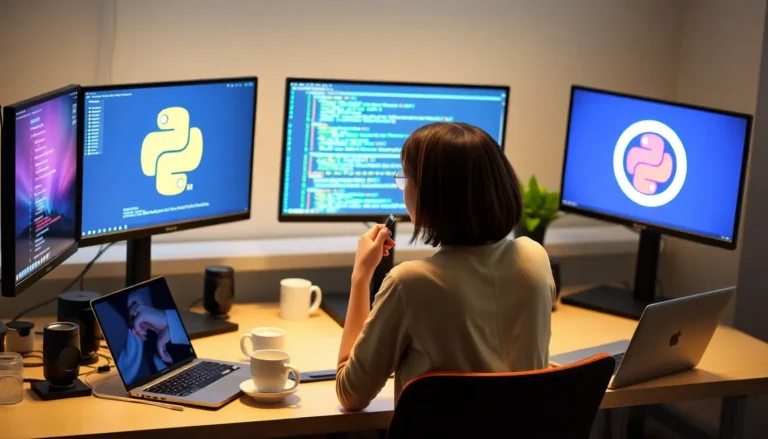Table of Contents
ToggleIn a world where technology evolves at lightning speed, staying updated on the latest trends is crucial. From artificial intelligence to blockchain, these innovations not only shape industries but also redefine everyday life. Understanding these trends can empower individuals and businesses alike to adapt and thrive in a rapidly changing landscape.
This Tech Trends Review dives into the most significant advancements and their implications. By exploring emerging technologies and their applications, readers will gain insights into how these trends influence various sectors. Whether it’s enhancing productivity or transforming customer experiences, the impact of technology is undeniable, making it essential to stay informed and ready for what’s next.
Overview of Tech Trends
Staying informed about current technology trends is essential as they rapidly evolve. Key advancements like artificial intelligence (AI), blockchain, and the Internet of Things (IoT) significantly reshape industries and everyday life.
Artificial Intelligence
Artificial Intelligence enhances productivity and improves decision-making processes. It automates tasks across various sectors, including healthcare, finance, and manufacturing. Companies leveraging AI report increased efficiency and cost savings.
Blockchain
Blockchain technology provides secure, transparent transactions. It creates decentralized systems that eliminate the need for intermediaries, reducing fraud and increasing trust. Industries such as supply chain management and finance benefit from blockchain’s ability to enhance security and traceability.
Internet of Things
The Internet of Things connects devices, enabling data exchange and automation. IoT applications exist in smart homes, industrial ecosystems, and healthcare. This integration streamlines operations and enhances user experiences through real-time data analytics.
5G Technology
5G technology revolutionizes connectivity, offering faster speeds and lower latency. With increased bandwidth, it supports the growth of connected devices and enhances mobile experiences. Applications include improved remote work capabilities and the advancement of augmented reality (AR) and virtual reality (VR).
Cybersecurity
Cybersecurity remains a critical focus as cyber threats evolve. Organizations prioritize robust security measures and solutions to protect sensitive data. Adopting AI-driven security systems helps identify threats in real time, enhancing overall safety.
Quantum Computing
Quantum computing promises unprecedented processing power. This technology has the potential to solve complex problems beyond the capabilities of traditional computers. Industries like pharmaceuticals and logistics anticipate significant advancements as quantum computing matures.
Staying informed about these tech trends empowers individuals and businesses to adapt and thrive in a changing landscape. Embracing these innovations fosters growth and competitiveness across various sectors.
Emerging Technologies

Emerging technologies continue to drive innovation and transformation across numerous sectors. This section examines the latest advancements in artificial intelligence and the Internet of Things.
Artificial Intelligence Advancements
Artificial intelligence (AI) experiences rapid advancements that enhance its capabilities in various sectors. Machine learning algorithms improve the processing of vast data sets, leading to better insights and more informed decision-making. Natural language processing enables sophisticated interactions between machines and humans, enhancing customer service through chatbots and virtual assistants. Companies leverage AI for predictive analytics, optimizing supply chain operations, and personalizing marketing strategies. With an expected global market value of $190 billion by 2025, AI’s integration into daily operations proves indispensable for maintaining competitiveness in an evolving landscape.
Internet of Things Developments
The Internet of Things (IoT) showcases significant developments that reshape connectivity and automation. Intelligent devices now communicate seamlessly, gathering and analyzing real-time data to improve efficiency. Smart home technology, including connected appliances and security systems, enhances user convenience and energy management. In industrial sectors, IoT applications streamline processes, reduce downtime, and boost predictive maintenance through enhanced data analytics. The IoT market is projected to reach $1.1 trillion by 2026, underscoring the importance of this technology in daily life and enterprise operations.
Impact of Tech Trends on Industries
Emerging technology trends significantly influence various industries by enhancing operational efficiency and improving customer interactions. The following sections highlight key impacts on specific sectors.
Healthcare Innovations
Healthcare experiences profound transformations due to technology trends. AI streamlines diagnostics and personalizes treatment plans, leading to improved patient outcomes. Telemedicine, powered by IoT devices and secure communication platforms, expands access to healthcare services, especially in remote areas. Blockchain technology enhances patient data management, ensuring secure and transparent sharing between providers. The global telemedicine market is anticipated to reach $459.8 billion by 2030, demonstrating the sector’s rapid adaptation.
Finance Sector Transformations
The finance sector undergoes significant changes driven by technology trends. Blockchain technology enhances transaction security and efficiency, enabling faster settlements and reduced fraud. AI algorithms analyze vast datasets, providing valuable insights for risk assessment and investment strategies. Fintech innovations, such as mobile payment systems and robo-advisors, improve customer access to financial services. The global fintech market is projected to reach $305 billion by 2025, illustrating the industry’s shift toward digital solutions and streamlined customer experiences.
Consumer Technology Trends
Consumer technology continues to evolve rapidly, with innovations enhancing daily life and advancing home and mobile technologies. Key trends include the proliferation of smart home devices and ongoing updates in mobile technology.
Smart Home Devices
Smart home devices offer convenience, security, and energy efficiency, reshaping living environments. Popular products include smart speakers, security cameras, and thermostats that connect through the Internet of Things. Voice-activated assistants like Amazon Alexa and Google Assistant control these devices, allowing users to manage home settings effortlessly. According to recent forecasts, the smart home market is projected to reach $174 billion by 2025, driven by consumer demand for automation and remote control capabilities. Advanced features, such as energy monitoring and compatibility with third-party devices, enhance user experiences and integration.
Mobile Technology Updates
Mobile technology consistently advances, improving user experiences and connectivity. The rollout of 5G networks enables faster download speeds, lower latency, and more reliable connections, significantly enhancing mobile applications. The smartphone market sees ongoing innovations, such as foldable displays and improvements in camera technology. In addition, trends such as mobile payment systems and augmented reality apps gain traction, providing users with new experiences. The global mobile payments market is expected to reach $12.06 trillion by 2027, indicating a robust shift towards digital transactions and an increasingly cashless society.
Future Predictions in Technology
Predictions about future technology trends highlight ongoing advancements that will shape various sectors.
- Artificial Intelligence (AI) is set to reach new heights with enhanced algorithms and increased automation. By 2030, AI’s market share may surpass $500 billion, leading to more intuitive applications that transform user experiences and industrial operations further.
- Blockchain technology is expected to expand beyond finance into areas like healthcare and governance, enabling secure, real-time data sharing. By 2025, smart contracts and decentralized applications may redefine how organizations interact, enhancing transparency and accountability.
- Internet of Things (IoT) is predicted to proliferate with billions of connected devices by 2030. The potential integration of AI in IoT devices will lead to more intelligent systems capable of predictive maintenance and optimized resource management.
- 5G technology will become a standard, facilitating innovations in autonomous vehicles and enhanced smart city infrastructures. By 2028, it may enable futuristic applications, including immersive augmented and virtual reality experiences.
- Cybersecurity measures will evolve with advances in AI, predicting and neutralizing threats faster. Cybersecurity spending is anticipated to exceed $300 billion by 2025 as organizations invest in robust defense mechanisms.
- Quantum computing could revolutionize industries by solving complex problems, with potential applications in drug discovery and financial modeling by 2026. Researchers are currently working on quantum systems that might outperform classic counterparts significantly.
Predictions emphasize the necessity for companies to adapt to these advancements, ensuring they leverage the latest technologies for optimal growth and competitiveness in their respective fields.
Staying ahead in the tech landscape is crucial for both individuals and businesses. The rapid advancements in AI blockchain IoT 5G cybersecurity and quantum computing are not just trends; they’re game-changers. Each technology brings unique opportunities and challenges that can redefine industries and enhance everyday experiences.
As these technologies continue to evolve it’s essential for stakeholders to remain informed and agile. Embracing these innovations will not only foster growth but also ensure competitiveness in an increasingly digital world. The future promises exciting developments that will further transform how we live and work.





